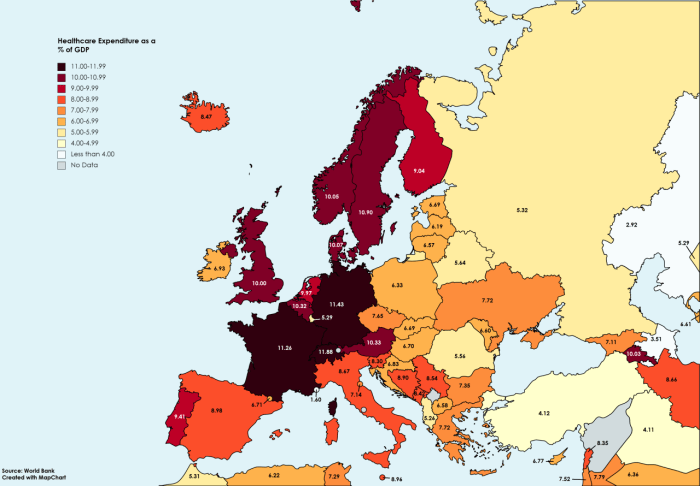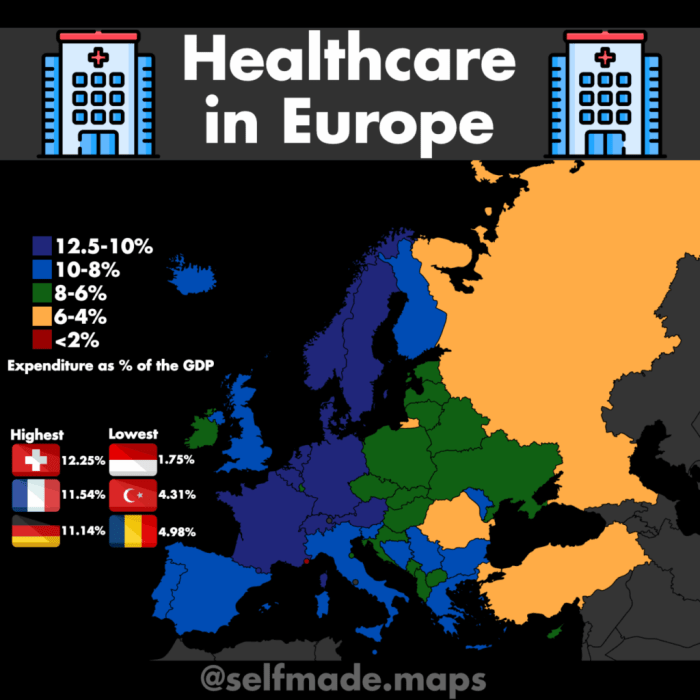Exploring the realm of affordable private health care options in Europe opens up a world of possibilities for individuals seeking quality healthcare without breaking the bank. From specialized services to innovative solutions, the landscape is diverse and promising.
As we delve deeper into the factors influencing affordability and the types of services available, a clearer picture emerges of how private healthcare can offer advantages over public options in various European countries.
Overview of Private Healthcare in Europe
Private healthcare in Europe offers a range of options for individuals seeking alternative care outside of the public system. While public healthcare is widely available and accessible in many European countries, private healthcare provides additional benefits and services for those willing to pay for them.
Current Landscape of Private Healthcare Options
Private healthcare in Europe varies greatly from country to country. Some countries, such as Germany, France, and Switzerland, are known for their high-quality private healthcare systems that offer a wide range of services, including shorter waiting times, access to top specialists, and more personalized care.
In contrast, countries like the UK and Spain also offer private healthcare options, but they are often seen as more complementary to the public system rather than a replacement.
Countries Known for Affordable Private Healthcare
Countries like Hungary, Poland, and the Czech Republic are known for providing affordable private healthcare options without compromising on quality. These countries offer competitive prices for medical treatments, consultations, and surgeries, making private healthcare more accessible to a wider population.
Benefits of Choosing Private Healthcare
Choosing private healthcare over public options in Europe can provide several benefits, including quicker access to medical services, more personalized care, and a wider range of treatment options. Private healthcare also offers a higher standard of comfort and amenities, as well as the ability to choose your own doctor or specialist for specific treatments.
Factors Influencing Affordability
Private healthcare affordability in Europe is influenced by several key factors, including the cost of medical services, insurance coverage, government regulations, and overall healthcare system efficiency. Let's delve into the specifics of how these factors impact the accessibility and affordability of private healthcare across different European countries.
Cost of Medical Services
The cost of medical services plays a significant role in determining the affordability of private healthcare in Europe. Countries with lower healthcare service costs generally offer more affordable private healthcare options. For instance, Eastern European countries like Hungary and Poland tend to have lower medical service costs compared to Western European countries like Switzerland or Norway.
Insurance Coverage
The availability and coverage of private health insurance also greatly influence the affordability of private healthcare in Europe. Countries with robust private health insurance systems, like Germany and the Netherlands, often have more affordable private healthcare options due to the shared cost burden between individuals and insurance providers.
On the other hand, countries with limited insurance coverage may result in higher out-of-pocket expenses for individuals seeking private healthcare services.
Government Policies
Government policies and regulations play a crucial role in shaping the affordability of private healthcare in Europe. Some governments subsidize private healthcare services or incentivize the use of private insurance, making it more accessible and affordable for their citizens. In contrast, stringent regulations or lack of government support can drive up private healthcare costs, making it less affordable for the general population.
Countries like France and the UK have implemented policies to ensure affordable private healthcare options for their residents through a combination of public and private partnerships.
Types of Private Healthcare Services Available

Private healthcare services in Europe offer a wide range of options for individuals seeking specialized medical care outside of the public healthcare system. These services cater to various needs and preferences, providing patients with more personalized and efficient care. Let's explore some of the common types of private healthcare services available in Europe and discuss their advantages and disadvantages.
Hospital Services
Private hospitals in Europe offer a range of medical services, from routine check-ups to complex surgeries. These hospitals are equipped with state-of-the-art technology and specialized medical staff to provide high-quality care to patients. The advantages of opting for private hospital services include shorter waiting times, personalized treatment plans, and a more comfortable and luxurious environment.
However, the cost of private hospital services can be significantly higher than public hospitals, making it less accessible to individuals with limited financial resources.
Specialized Clinics
Specialized clinics in Europe focus on specific medical fields such as dermatology, cardiology, or orthopedics. These clinics provide specialized care and expertise in their respective areas, offering patients access to highly skilled healthcare professionals and advanced treatment options. The advantages of specialized clinics include tailored treatment plans, in-depth consultations, and cutting-edge medical technologies.
However, the cost of services at specialized clinics can vary depending on the complexity of the treatment, potentially making them expensive for some patients.
Telemedicine Services
Telemedicine services in Europe allow patients to consult with healthcare professionals remotely, using digital platforms such as video calls or messaging apps. These services are convenient for individuals who require non-emergency medical advice or follow-up consultations. The advantages of telemedicine services include accessibility, reduced travel time, and immediate access to medical expertise.
However, limitations may arise in cases where physical examinations or in-person assessments are necessary for accurate diagnosis and treatment.
Wellness and Preventive Care Programs
Private healthcare providers in Europe offer wellness and preventive care programs designed to promote overall health and well-being. These programs may include health screenings, lifestyle counseling, nutrition plans, and fitness assessments. The advantages of participating in wellness programs include early detection of health issues, personalized health recommendations, and a focus on preventive measures to maintain optimal health.
However, the cost of enrolling in wellness programs may vary depending on the services included, potentially making them a financial burden for some individuals.
Access to Affordable Private Health Insurance
Health insurance plays a crucial role in accessing affordable private healthcare in Europe. It provides individuals with financial protection against high medical costs and ensures access to a wide range of healthcare services offered by private providers.
Comparison of Health Insurance Plans
There are various health insurance plans available for individuals seeking private healthcare in Europe. These plans differ in terms of coverage, premiums, deductibles, and network of healthcare providers. It is essential for individuals to compare these plans carefully to choose the one that best suits their needs and budget.
- Basic Health Insurance: This type of plan offers essential coverage for hospitalization, consultations, and basic medical services.
- Comprehensive Health Insurance: These plans provide more extensive coverage, including specialist consultations, diagnostic tests, and additional services.
- High-Deductible Health Plans: These plans have lower premiums but higher deductibles, making them suitable for individuals who prefer to pay less upfront.
Finding Cost-Effective Health Insurance
Individuals can find cost-effective health insurance for private healthcare by considering the following factors:
- Assessing Healthcare Needs: Understand your healthcare needs and choose a plan that covers essential services without unnecessary extras.
- Comparing Premiums and Deductibles: Evaluate the total cost of the plan, including premiums and deductibles, to find the most affordable option.
- Reviewing Network of Providers: Check if your preferred healthcare providers are included in the plan's network to avoid additional out-of-pocket expenses.
- Exploring Additional Benefits: Look for plans that offer added benefits like wellness programs, telemedicine services, or prescription drug coverage to maximize value.
Innovative Solutions for Affordable Private Healthcare
Innovative solutions and technologies are playing a crucial role in making private healthcare more affordable in Europe. These advancements are aimed at reducing costs and improving access to quality healthcare services for individuals.
Telemedicine and Remote Consultations
Telemedicine has been a game-changer in the field of private healthcare by allowing patients to consult with healthcare providers remotely. This eliminates the need for in-person visits, reducing travel costs and saving time for both patients and healthcare professionals. Digital health platforms enable virtual consultations, diagnosis, and monitoring of patients, making healthcare more accessible and cost-effective.
Healthcare Apps and Wearable Devices
The use of healthcare apps and wearable devices has gained popularity in Europe, enabling individuals to track their health metrics, receive personalized health recommendations, and access medical information conveniently. These tools encourage preventive care and early intervention, ultimately reducing healthcare costs by preventing the progression of diseases.
AI and Machine Learning in Healthcare
Artificial intelligence (AI) and machine learning technologies are being utilized in private healthcare to streamline processes, enhance diagnostic accuracy, and personalize treatment plans. By leveraging AI algorithms, healthcare providers can optimize resource utilization, reduce medical errors, and improve patient outcomes, contributing to cost savings in the long run.
Collaborative Care Models
Collaborative care models involve multidisciplinary teams working together to deliver comprehensive and coordinated healthcare services to patients. By promoting communication and shared decision-making among healthcare professionals, these models improve efficiency, reduce unnecessary tests and procedures, and ensure cost-effective care delivery while maintaining quality standards.
Outcome Summary

In conclusion, the realm of affordable private health care options in Europe is rich with opportunities for individuals to access quality healthcare at reasonable costs. By understanding the key factors influencing affordability and the diverse range of services available, individuals can make informed decisions about their healthcare needs.
Answers to Common Questions
What are the key benefits of choosing private healthcare over public options in Europe?
Private healthcare in Europe often offers shorter wait times, more personalized care, and access to specialized services that may not be available in public healthcare systems.
How do government policies impact the affordability of private healthcare in Europe?
Government policies can influence the cost of private healthcare through regulations, subsidies, and incentives that either promote or hinder affordability for individuals.
What are some innovative solutions or technologies that are making private healthcare more affordable in Europe?
Technologies such as telemedicine and digital health platforms are revolutionizing the way healthcare is delivered, making services more accessible and cost-effective for patients.








![Sleep Statistics By Mental Health and Facts [2024*]](https://br.genpi.co/wp-content/uploads/2025/09/VaNVZ-health-issue-impacting-sleep-75x75.png)

